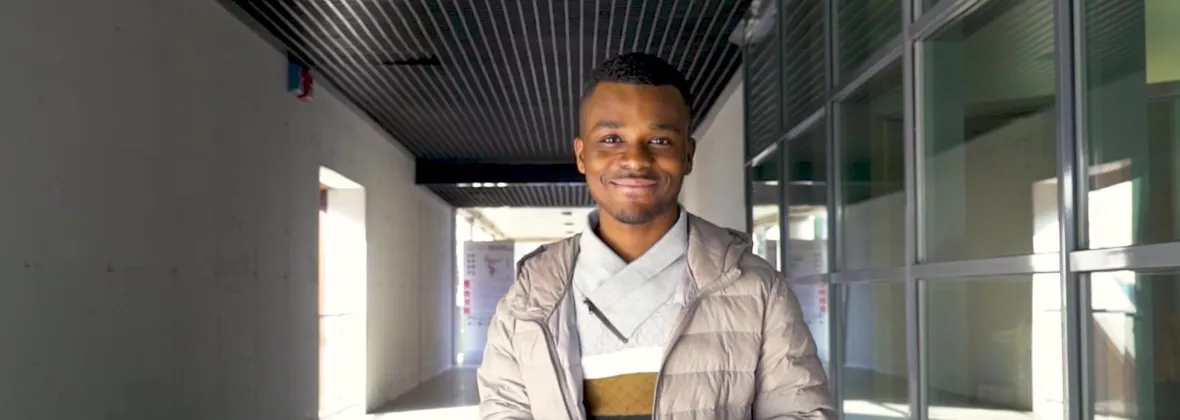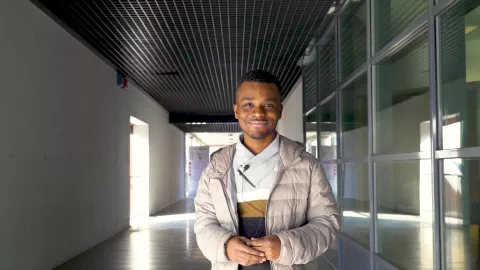
Hi! My name is Kwasi Baah Asante and I am originally from Ghana, central West Africa.
At the moment I am in my final year pursuing my degree in Medicine and Surgery.
Q&A
1. Which is your favorite Italian cultural thing/habit?
There are many cultural habits I love about Italy, but what stands out the most is the important value of family life, whereby families normally have gatherings to eat together and stay together during the weekends or during holidays. I believe such tradition is widely spread due to the many holidays we have over here and spending it with family and loved ones is a great idea.
2. Do you participate in any extracurricular activity organized/promoted by UniBs? If yes, which one/ones?
I used to participate in seminars offered by the university, but at the moment I am not participating in any extracurricular activity due to my busy schedule, especially being in my final year and having my thesis to write and internship to do in order to complete my academic experience. Nevertheless, there are many interesting activities offered by UniBs like language courses, seminars, voluntary internship activities, 150 ore (which is an activity whereby students are offered the possibility to assist UniBs workers by doing study room, anatomy lab, IT lab surveillance, or work alongside UniBs staff in the administrative offices), UniBs choir and many more.
3. How would you describe the academic atmosphere and teaching methods at the University of Brescia for international students?
The academic atmosphere at the University of Brescia is a very conducive one. I can define Unibs as a multicultural and globalized university not only because its international influence in the field of research but mostly because it brings students from different background settings together, both from developed countries and developing countries, giving them equal platforms and opportunities to exploit their academic prowess. Many courses are offered also in English, giving international students the chance to further their
education unhindered by the Italian language barrier. As for the teaching methods, lessons are offered face to face, but after covid, the possibility to request for blended learning has been given to some courses.
4. Were there any extracurricular activities or clubs geared towards international students that you found particularly engaging or helpful?
Sure! As stated before, some of the extracurricular activities include 150 ore, which helps a lot of international students to get some financial relief since there is a monetary retribution for the rendered services. Beside that, italian language courses are offered to help international students learn the Italian language. For the past two academic years I have been working as a senior, which means I collaborate with the university residence’s staff by tutoring the students that live in the campus and standing as a mediator to help them and foster their wellbeing in terms of accommodation (I run tasks like choosing a
room for them when they are absent or still in their countries of origin, meeting them on the first day of arrival to introduce them to the campus and lead them to their rooms, availing myself to assist them in times of need to show them something as simple as where they can find a supermarket to more complex matters like taking them to the police headquarters for their residence permit or to the hospital or to run lab tests). I also assist them communicating their wants and needs to the reception and I make sure they follow the rules and regulations of the university campus.
5. What were the opportunities for internships, research projects, or collaborations with local industries or businesses for international students?
Many opportunities range from Erasmus, thesis research programs abroad, collaborations with local industries or businesses during internship or dissertation and, in my course in particular, opportunities are given for some students interested in anatomy to go to Austria for some few days to further their knowledge of the human anatomy. Being in the medical department I normally do my internship in different hospitals both in the main city of Brescia and in the outskirts; but mainly I have been doing my apprenticeship in Spedali Civili, which is located 10 minutes of walk distance from the university. I normally stay for a week or two in a department and work with the doctors and the resident doctors who guide me as tutors teaching the practical aspects of what we have learnt theoretically. The experience is altogether helpful because it introduces us to our future profession by helping us to relate with patients.


